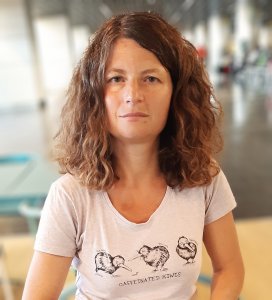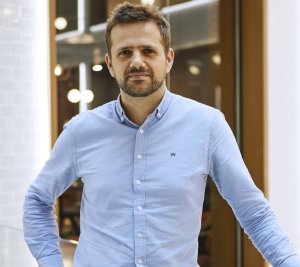Keynote Speakers
Yejin Choi

Common Sense: The Dark Matter of Language and Intelligence
Abstract: Scale appears to be the winning recipe in today’s leaderboards. And yet, extreme-scale neural models are (un)surprisingly brittle and make errors that are often nonsensical and even counterintuitive. In this talk, I will argue for the importance of knowledge, especially commonsense knowledge, as well as inference-time reasoning algorithms, and demonstrate how smaller models developed in academia can still have an edge over larger industry-scale models, if powered with knowledge and/or reasoning algorithms.
Bio: Yejin Choi is Brett Helsel professor at the Paul G. Allen School of Computer Science & Engineering at the University of Washington and also a senior research director at AI2 overseeing the project Mosaic. Her research investigates a wide variety problems across NLP and AI including commonsense knowledge and reasoning, neural language (de-)generation, language grounding with vision and experience, and AI for social good. She is a MacArthur Fellow and a co-recipient of the NAACL Best Paper Award in 2022, the ICML Outstanding Paper Award in 2022, the ACL Test of Time award in 2021, the CVPR Longuet-Higgins Prize (test of time award) in 2021, the NeurIPS Outstanding Paper Award in 2021, the AAAI Outstanding Paper Award in 2020, the Borg Early Career Award (BECA) in 2018, the inaugural Alexa Prize Challenge in 2017, IEEE AI’s 10 to Watch in 2016, and the ICCV Marr Prize (best paper award) in 2013. She received her Ph.D. in Computer Science at Cornell University and BS in Computer Science and Engineering at Seoul National University in Korea.
Iain Couzin

Geometric Principles of Individual and Collective Decision-Making
Abstract: In 1905 the biologist Edmund Selous wrote of his wonderment when observing a flock of starlings flying overhead “they circle; now dense like a polished roof, now disseminated like the meshes of some vast all-heaven-sweeping net…wheeling, rending, darting…a madness in the sky”. He went on to speculate “They must think collectively, all at the same time, or at least in streaks or patches — a square yard or so of an idea, a flash out of so many brains”. While the field of neuroscience has emerged to study the computational capabilities within an organism, far less is known about how social interactions connect brains together—and thus how sensing and information processing arises in such organismal collectives. Using new experimental technologies, including ‘holographic’ virtual reality for freely-moving animals, bio-mimetic robotics and artificial intelligence, I will present evidence that there exist fundamental geometric principles of spatiotemporal computation that transcend scales of biological organization; from neural dynamics to individual decision-making, and from individual decision-making to that at the scale of animal collectives. I will also show how this discovery may impact human-engineered systems, demonstrating that the evolved controller exhibits close-to-optimal performance in autonomous vehicle (terrestrial, airborne and watercraft) control, while requiring minimal sensing/computation and no system-specific tuning or optimization.
Bio: Iain Couzin is Director of the Max Planck Institute of Animal Behavior and Speaker of the Excellence Cluster “Centre for the Advanced Study of Collective Behaviour” at the University of Konstanz, Konstanz, Germany. Previously he was an Assistant- and then Full-Professor in the Department of Ecology and Evolutionary Biology at Princeton University, and prior to that a Royal Society University Research Fellow in the Department of Zoology, University of Oxford, and a Junior Research Fellow in the Sciences at Balliol College, Oxford. His work aims to reveal the fundamental principles that underlie evolved collective behavior, and consequently his research includes the study of a wide range of biological systems, from neural collectives to insect swarms, fish schools and primate groups. In recognition of his research he has been recipient of the Searle Scholar Award in 2008, top 5 most cited papers of the decade in animal behavior research 1999-2010, the Mohammed Dahleh Award in 2009, Popular Science’s “Brilliant 10” Award in 2010, National Geographic Emerging Explorer Award in 2012, the Scientific Medal of the Zoological Society of London in 2013, a Web of Science Global Highly Cited Researcher since 2018, the Lagrange Prize in 2019, and the Falling Walls Life Sciences Award and Leibniz Prize (Germany’s highest research honor) in 2022.
Edith Elkind

Keywords: Multiwinner voting; proportionality; local search
Acknowledgements: This talk is based on a series of papers, some of which were supported by an ERC Starting Grant ACCORD (GA 639945). The author would like to thank her collaborators on these papers: Jesús Arias-Fisteus, Haris Aziz, Pablo Basanta Val, Markus Brill, Vincent Conitzer, Piotr Faliszewski, Norberto Fernández Garcia, Rupert Freeman, Shenwei Huang, Ayumi Igarashi, Sonja Kraiczy, Martin Lackner, Pasin Manurangsi, Luis Sánchez Fernández, Ulrike Schmidt-Kraepelin, Piotr Skowron, Warut Suksompong, and Toby Walsh.
Proportionality in Multiwinner Voting: The Power of Local Search
Abstract: In multiwinner voting, voters report their preferences over the available alternatives, and the goal is to select a fixed-size subset of alternatives, usually referred to as a committee; this model captures a variety of real-life scenarios, from selecting a representative governing body to deciding which search results should appear on the first page of a search engine’s output or selecting validators for a proof-of-stake blockchain protocol.
A particularly well-studied special case of this general setting is multiwinner voting with approval ballots, where each voter reports which alternatives they approve. A key desideratum in multiwinner voting is proportionality, i.e., assuring that large groups of voters with similar preferences receive appropriate representation in the selected committee. In the context of approval ballots, a series of papers proposed a family of axioms that aim to capture this intuition, including (from weakest to strongest) justified representation, proportional/extended/full justified representation, and the core. A major research challenge, then, is to identify voting rules that are efficiently computable and whose outputs satisfy these axioms; another important goal is to design efficient verification methods that can decide whether a given committee satisfies an axiom.
In this talk, we will survey recent progress on these challenges, compare the properties of several multiwinner voting rules with strong axiomatic properties, discuss tradeoffs between proportionality and other objectives (such as, e.g., social welfare), and highlight the power of local search to produce high-quality, easily verifiable solutions in a robust and flexible manner.
Bio: Edith Elkind is a Professor of Computer Science at University of Oxford. She works in algorithmic game theory and computational social choice, with a focus on multiwinner voting and structured preference domains. Edith is a EurAI Fellow and an ELLIS Fellow. She has supervised two PhD dissertations that received the IFAAMAS Victor Lesser Distinguished Dissertation Award. Edith contributed to the AAMAS community as a program chair (2015), a general chair (2019), an IFAAMAS board member (2014-2019) and an editorial board member of JAAMAS (2010 – now).
Karl Tuyls

Multiagent learning: from fundamentals to foundation models
Abstract: Research in multiagent learning has come a long way over the past few decades, from learning in abstract normal-form games such as Rock-Paper-Scissors, to learning in complex worlds such as Humanoid Soccer, Capture the Flag, Gran Turismo racing, and recently board games such as Diplomacy and Stratego. In this talk I will take you on a journey that starts in the mid 90’s and sheds light on algorithmic progress over the years in multiagent learning systems, uncovering game-theoretic fundamentals for reinforcement learning, adaptability, and decision-making. There have been two major research eras in the field thus far, the pre-deep multiagent learning and deep multiagent learning periods. I believe we are now at the verge of a third period, multiagent learning with foundation models. We will connect old and new ideas of the first two periods, and lay out interesting challenges ahead of us for the coming era. Specifically, we consider the ways in which the cornerstone ideas of the first two periods may inform the development of generally capable multi-agent foundation models in the future.
Bio: Karl Tuyls (FBCS) is a research director at DeepMind where he leads the Game Theory & MultiAgent Team. He is also an honorary professor of Computer Science at the University of Liverpool, UK, and a Guest Professor at the University of Leuven, Belgium. Previously, he held academic positions at the Vrije Universiteit Brussel, Hasselt University, Eindhoven University of Technology, and Maastricht University. Prof. Tuyls has received several awards with his research, amongst which: the Information Technology prize 2000 in Belgium, best demo award at AAMAS’12, winner of various Robocup@Work competitions (’13, ’14), and he was a co-author of the runner-up best paper award at ICML’18. He co-invented DeepNash, the first AI agent to reach human expert-level performance in the imperfect information game Stratego. Furthermore, his research has received substantial attention from international press and media, most recently his work on football analytics and Graph Imputer featured in Wired UK and Nature. He is a fellow of the British Computer Society (BCS), is on the editorial board of the Journal of Autonomous Agents and Multi-Agent Systems, and is (co)-editor-in-chief of the Springer briefs series on Intelligent Systems. Prof. Tuyls is also an emeritus member of the board of directors of the International Foundation for Autonomous Agents and Multiagent Systems.